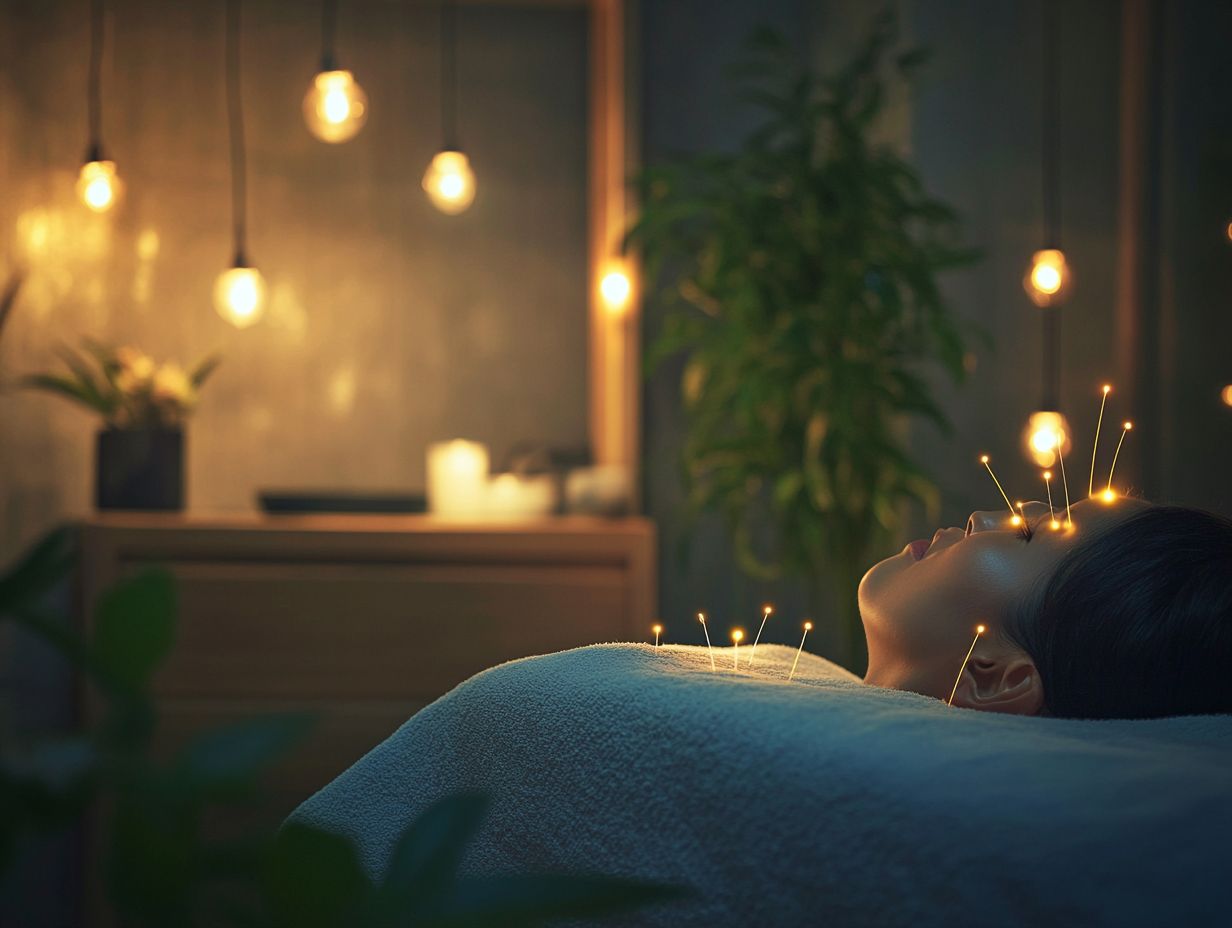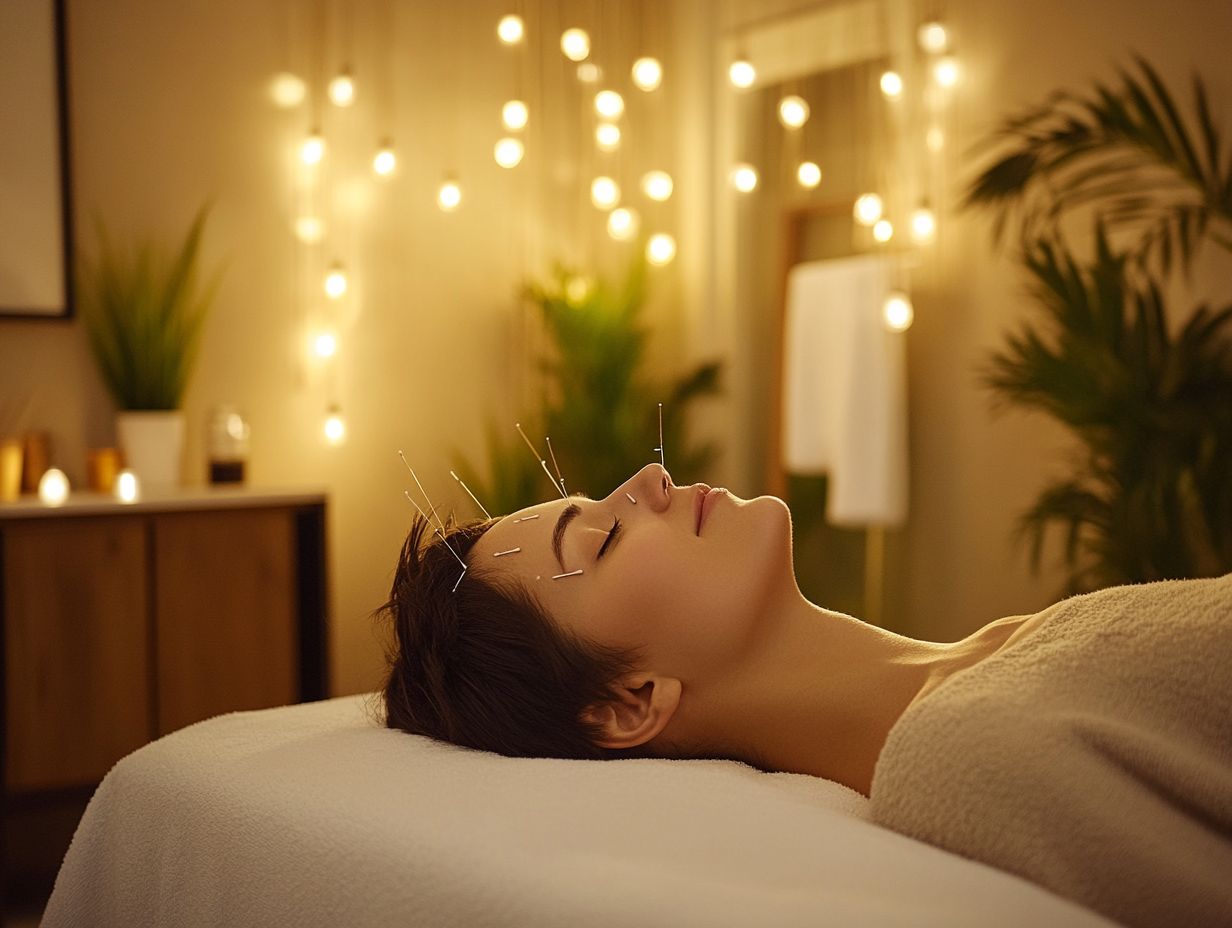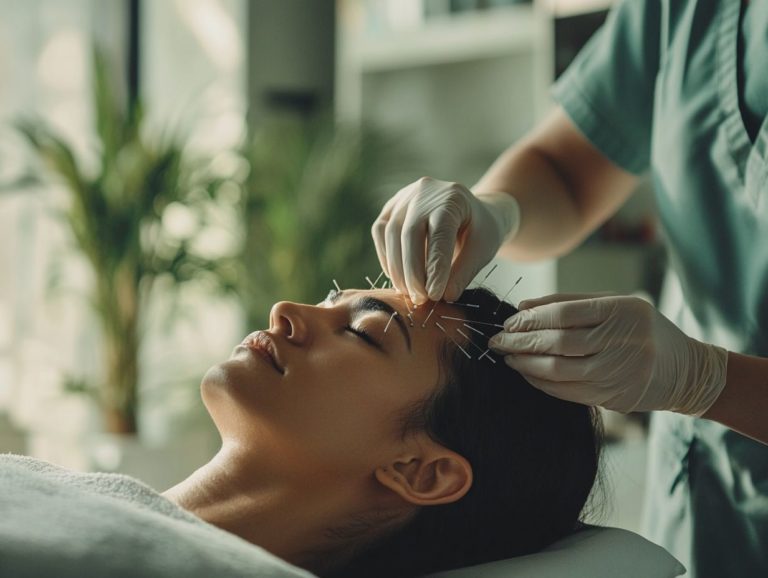Acupuncture Treatment for Migraines: A Comprehensive Guide
Don’t let migraines control your life. Explore acupuncture as a real solution today!
Migraines can be utterly debilitating, impacting not only your head but also your overall quality of life. As you seek natural remedies, acupuncture stands out as a promising option worth exploring.
This article delves into how acupuncture functions. It highlights specific techniques tailored for migraine relief and what you can expect during a session.
It will also cover other natural remedies and important precautions to keep in mind. By gaining a deeper understanding of the role acupuncture can play, you can make informed choices in your quest for migraine relief.
Contents
- Key Takeaways:
- Understanding Migraines
- How Acupuncture Can Help with Migraines
- What to Expect During an Acupuncture Session
- Other Natural Remedies for Migraines
- Precautions and Considerations
- Frequently Asked Questions
- What is acupuncture treatment for migraines?
- Who can benefit from acupuncture treatment for migraines?
- How does acupuncture help with migraines?
- What can I expect during an acupuncture treatment for migraines?
- How many acupuncture sessions will I need for my migraines?
- Are there any side effects of acupuncture treatment for migraines?
Key Takeaways:

Acupuncture treatment can provide relief for migraine sufferers by targeting specific points and using various techniques to alleviate symptoms.
Understanding the underlying causes and triggers of migraines can help guide the use of acupuncture and other natural remedies for more effective results.
When considering acupuncture treatment for migraines, it is important to consult with a licensed practitioner and discuss any potential safety concerns or precautions.
What is Acupuncture?
Acupuncture is an ancient practice rooted in traditional Chinese medicine. It aims to restore harmony in your body by manipulating the flow of energy, known as Qi, which is the body’s vital energy.
This is achieved through the careful insertion of fine needles into specific pathways. Embracing this holistic approach addresses a range of health concerns and underscores the necessity of maintaining a balanced state for your physical and mental well-being.
With roots stretching back over two millennia, acupuncture reflects a profound understanding of the body s complexities. It is founded on the belief that Qi flows through a network of meridians, and any interruption in this flow can lead to illness.
By stimulating targeted points along these meridians, practitioners seek to restore equilibrium and alleviate pain. The deep connection between the mind and body in traditional Chinese medicine highlights acupuncture’s significance, demonstrating its capability to foster long-term wellness.
How Does it Help with Migraines?
Acupuncture has emerged as a promising intervention for treating migraines. Clinical trials support its effectiveness in delivering relief and reducing the frequency of attacks, and it is also being explored for other benefits, such as weight loss.
Many patients report significant improvement in their headache management, crediting this therapy for their enhanced well-being. Rather than merely addressing symptoms, acupuncture delves into the underlying causes.
Numerous studies indicate that acupuncture activates specific points in the body. This triggers the release of endorphins and other neurotransmitters that enhance pain relief and promote relaxation.
Unlike pharmacological treatments, which often come with side effects or potential dependency, acupuncture is generally well-tolerated. It encourages your body’s innate healing processes.
While some skeptics might dismiss positive outcomes as merely the placebo effect, countless testimonials highlight the consistent benefits of repeated sessions. This integrative approach not only alleviates discomfort but also nurtures a deeper connection between mind and body, enriching the overall healing experience.
Understanding Migraines
Understanding migraines means acknowledging the intricate interplay of numerous factors. These include both their causes and triggers, which can span from lifestyle choices to physiological conditions.
Remember, a migraine is not merely a headache; it can be profoundly debilitating. Effective management often necessitates a blend of preventative medications and lifestyle adjustments to enhance overall quality of life.
Causes and Triggers
Migraines can be triggered by a multitude of factors, including environmental influences and lifestyle choices. Understanding these causes is crucial for effective management.
Common triggers often include stress, hormonal fluctuations, dietary habits, and specific environmental conditions. These can lead to episodes that vary in both frequency and intensity.
Your experience with migraines is uniquely yours, shaped by personal sensitivities to foods like aged cheeses or chocolate. Additives, such as MSG, and emotional states like anxiety and depression also significantly contribute to triggering attacks. Additionally, environmental factors like weather changes or strong odors can play a role.
Recognizing these diverse triggers is essential, as what may provoke a migraine for one person might not have the same effect on you.
Creating personalized headache management strategies tailored to your individual triggers can greatly enhance your quality of life while reducing the frequency and severity of migraine episodes.
How Acupuncture Can Help with Migraines

Acupuncture presents a compelling solution for managing migraines by restoring Qi balance and targeting the root causes of headaches. If you’re curious about its effectiveness, check out acupuncture for headaches: is it right for you? Many studies show that this approach can lead to a notable reduction in the frequency of migraine episodes.
Numerous randomized trials have provided robust evidence for anyone exploring holistic alternatives to traditional pharmacological treatments.
Specific Points and Techniques
In acupuncture, specific points along the meridian pathways are targeted to restore Qi balance and alleviate migraine symptoms. Practitioners use various techniques, including needle insertion, a method that involves burning mugwort herb to improve energy flow, and cupping, which creates suction on the skin to relieve tension.
Key acupuncture points for treating migraines include:
- GV20 at the vertex commonly used for overall energy balance and headache relief.
- LI4 on your hand often utilized for pain relief and relaxation.
These points help facilitate the smooth flow of energy throughout your body. When needles are inserted at these locations, you ll likely experience a decrease in both the frequency and intensity of your migraine attacks.
By targeting these specific points, practitioners aim to harmonize your body s energies, leading to an overall sense of well-being and a reduction in migraine symptoms.
What to Expect During an Acupuncture Session
During an acupuncture session, expect a detailed assessment leading to a personalized treatment plan tailored to your unique health concerns, such as finding relief from migraines.
The process generally involves the careful insertion of thin needles at specific points on your body. This procedure may offer various benefits, from alleviating pain to enhancing your overall well-being.
The Process and Potential Benefits
The acupuncture process entails a thorough assessment, precise needle placement, and relaxation techniques, meticulously crafted to enhance your treatment for migraine relief. As energy flow improves and headache frequency decreases, your quality of life may elevate significantly.
Through comprehensive consultation, practitioners can pinpoint individual triggers and customize sessions to meet your specific needs. Each treatment typically features strategic placement of ultra-thin needles at particular points, promoting circulation and easing tension. Many individuals report remarkable reductions in both the intensity and duration of their migraine episodes.
These sessions don t just tackle migraines; they foster overall well-being. Users often report improved sleep patterns and reduced anxiety. Such holistic benefits reinforce the effectiveness of acupuncture as a crucial component of your migraine management plan.
Other Natural Remedies for Migraines
In addition to acupuncture, explore a range of natural remedies for migraines that can serve as complementary therapies, enhancing the overall effectiveness of your treatment.
These remedies often encompass lifestyle changes, dietary adjustments, and various holistic approaches designed to minimize migraine triggers while improving your overall health.
Complementary Therapies and Lifestyle Changes

Are you tired of battling migraines? Incorporating complementary therapies and lifestyle changes can significantly elevate the effectiveness of natural remedies for managing migraines. Strategies like stress reduction techniques, balanced nutrition, and consistent exercise are crucial in minimizing triggers and fostering a healthier lifestyle.
One of the most beneficial practices you can embrace is yoga. It not only enhances your flexibility and strength but also alleviates stress and tension two common culprits behind migraines. Meditation is another powerful tool that nurtures mindfulness, enabling you to recognize early warning signs and implement coping strategies before a migraine escalates.
Consider dietary supplements such as magnesium and riboflavin, which have demonstrated promise in decreasing both the frequency and severity of migraines. These can beautifully complement acupuncture treatments.
By adopting a holistic health approach, you acknowledge the interconnectedness of these therapies and empower yourself to develop a comprehensive migraine management plan that addresses both physical and emotional well-being.
Precautions and Considerations
When contemplating acupuncture as a treatment for migraines, it s crucial to be mindful of specific precautions and considerations that will safeguard both your well-being and the efficacy of the treatment.
Engaging with qualified healthcare providers is essential; they can help you address any underlying health issues and discuss any potential contraindications. Your proactive approach ensures a more informed and effective treatment experience.
Safety and Effectiveness of Acupuncture for Migraines
The safety and effectiveness of acupuncture for migraines have been bolstered by a range of clinical trials. These studies show it can be a helpful treatment for many people with migraines. While acupuncture is generally considered safe, it is essential to discuss your individual health circumstances with your healthcare provider to ensure the best possible outcomes.
In a noteworthy study published in the journal Neurology, researchers discovered that patients undergoing acupuncture reported a significant decrease in both the frequency and intensity of their migraines compared to those who did not receive the treatment.
A meta-analysis a study that reviews multiple research studies of several trials revealed that acupuncture could offer pain relief comparable to that of preventive medications but without the typical side effects associated with pharmaceuticals.
These findings highlight the necessity of maintaining an open dialogue with your healthcare provider. By sharing your treatment preferences and health history, you can work together to develop a personalized approach that enhances the effectiveness of acupuncture for your specific needs.
Frequently Asked Questions
What is acupuncture treatment for migraines?
Acupuncture treatment for migraines is a form of traditional Chinese medicine that involves using thin needles inserted into specific points on the body to help alleviate migraine symptoms and prevent future occurrences.
Who can benefit from acupuncture treatment for migraines?

Anyone who experiences migraines can potentially benefit from acupuncture treatment. It is a safe and effective option for those seeking a non-pharmaceutical approach to managing their migraines.
How does acupuncture help with migraines?
Acupuncture is believed to help with migraines by stimulating the body’s natural healing processes and promoting the flow of energy. It can also help to relax the muscles and relieve tension, which can contribute to migraine pain.
What can I expect during an acupuncture treatment for migraines?
During an acupuncture treatment for migraines, the acupuncturist will insert thin needles into specific points on your body. You may feel a slight sensation or pressure, but it should not be painful. The needles will remain in place for about 20-30 minutes, and you may also receive additional therapies such as cupping or herbal remedies. For a deeper understanding, refer to acupuncture vs. traditional medicine.
Ready to explore acupuncture? Talk to your healthcare provider today!
How many acupuncture sessions will I need for my migraines?
The number of acupuncture sessions for migraines varies from person to person. Some people might feel better after just a few visits, while others may need ongoing care.
Your acupuncturist will create a custom treatment plan just for you. This plan will be tailored to your specific symptoms and needs.
Are there any side effects of acupuncture treatment for migraines?
In general, acupuncture is safe and most people tolerate it well. You might notice some minor side effects like slight bruising or soreness where the needles go in.
Don’t worry! These side effects are temporary and usually go away in a day or two.






